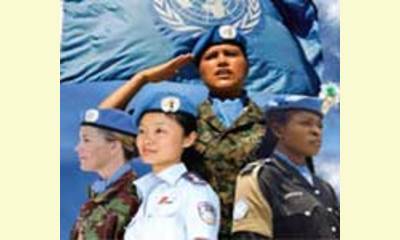|
|
West African Women Leaders Train in Peacebuilding and Mediation
un articulo por United Nations Office for West Africa
Abuja, Nigeria, 22 July 2011 - This week UN Women and the United Nations Office for West Africa (UNOWA) are training women leaders to strengthen their mediation capacities in peacebuilding processes to prioritize women’s specific needs.

The training session, which runs from 19 to 23 July in Abuja, Nigeria, brings together 32 women from 16 West African countries and focuses on the techniques of mediation, advocacy, negotiation and the implementation of peace agreements. The training is in line with the strategic priorities of UN Women and UNOWA to increase women’s participation in conflict-resolution efforts, including conflict-related sexual violence.
The mediation training responds to a Regional Action Plan adopted by West African Gender and Women Affairs Ministers during the 10th anniversary of UN Security Council resolution (UNSCr) 1325 on women, peace and security last year. One of the key actions includes increasing women’s representation in peacebuilding processes.
A UN Women review reveals that since 1992 fewer than 10 percent of peace negotiators have been women and there has been little appreciable increase since the passage of UNSCr 1325 in 2000.
This activity is implemented with the support of the Kingdom of Norway and in close collaboration with the Economic Community for West African States (ECOWAS) and the Network on Peace and Security for Women in the ECOWAS Region (NOPSWECO).
|








|
DISCUSSION
Pregunta(s) relacionada(s) al artículo :
UN Resolution 1325, does it make a difference?,
* * * * *
Comentario más reciente:
A recent study by the NGO Working Group on Women, Peace and Security is critical of the UN Security Council for its inconsistent implement of Resolution 1325 that calls for an increased role of women in peacekeeping and peacebuilding. The full report is available on the Internet on the website of womenpeacesecurity.org.
The working group members are an impressive group of active international NGOs: Amnesty International; Consortium on Gender, Security and Human Rights; Femmes Africa Solidarité; Global Action to Prevent War; Global Justice Center; Human Rights Watch; The Institute for Inclusive Security; International Action Network on Small Arms; International Alert; International Rescue Committee; Refugees International; International Women’s Program of the Open Society Foundations; Social Science Research Council; Women’s Refugee Commission; Women’s Action for New Directions; Women’s International League for Peace and Freedom.
Here is the report's Summary of Findings
General trends in the Council over the last 12 years have shown significant development, including in the language and expertise on women, peace and security in resolutions, more expertise available to deploy in terms of gender advisors and women, peace and security, and a more sophisticated understanding of the key issues at the root of this agenda. There is a better understanding of, for example, what it takes to have disarmament, demobilization, and reintegration processes that are responsive to women; security sector reform that is responsive to women; and post-conflict elections that support women candidates and women voter. However, there is inconsistency in the Council’s deployment of that knowledge. There is still a significant disconnect between the content of reports received by the Council, meetings the Council holds, and resolutions it adopts.
There have been a number of positive developments in the Council’s use of women, peace and security-specific language in its policy over the last year. For the first time, for example, the Council used women, peace and security language in its resolution on Cyprus. However, there have also been inconsistencies. The Council’s initial lack of support for women in September 2011’s resolution on Libya was rectified by strong support in its March 2012 renewal. . ... continuación.

|
|









